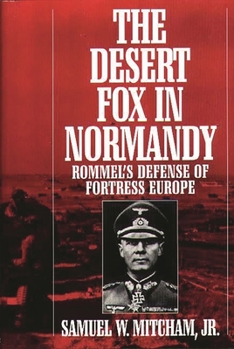The Desert Fox In Normandy: Rommel's Defense Of Fortress Europe
Select Format
Select Condition 
Book Overview
Perhaps the most famous and admired soldier to fight in World War II was Field Marshal Erwin Rommel, who achieved immortality as the Desert Fox. Rommel's first field command during the war was the 7th Panzer Division-also known as the Ghost Division-which he led in France in 1940. During this campaign, the 7th Panzer suffered more casualties than any other division in the German Army. During the process, it inflicted a disporoportionate amount of casualties upon the enemy. It took 97,486 prisoners, captured 458 tanks and armored vehicles, 277 field guns, 64 anti-tank guns and 4,000 to 5,000 trucks. It captured or destroyed hundreds of tons of other military equipment, shot down 52 aircraft, destroyed 15 more aircraft on the ground, and captured 12 additional planes. It destroyed the French 1st Armored Division and the 4th North African Division, punched through the Maginot Line extension near sSivry, and checked the largest Allied counteroffensive of the campaign at Arras. When France surrendered, the Ghost Division was within 200 miles of the Spanish border. No doubt about it-Rommel had proven himself a great military leader who was capable of greater things. His next command, in fact, would be the Afrika Korps, where the legend of the Desert Fox was born.
Rommel had a great deal of help in France-and much more than his published papers suggest. His staff officers and company, battalion and regimental commanders were an extremely capable collection of military leaders, which included 12 future generals (two of them SS), and two colonels who briefly commanded panzer divisions but never reached general rank. They also included Colonel Erich von Unger, who would no doubt have become a general had he not been killed in action while commanding a motorized rifle brigade on the Eastern Front in 1941, as well as Kark Hanke, a Nazi gauleiter who later succeeded Heinrich Himmler as the last Reichsfuehrer-SS. No historian has ever recognized the talented cast of characters who supported the Desert Fox in 1940. No one has ever attempted to tell their stories. This book remedies this deficiency. In the weeks prior to D-Day, Rommel analyzed Allied bombing patterns and concluded that they were trying to make Normandy a strategic island in order to isolate the battlefield. Rommel also noticed that the Allies had mined the entire Channel coast, while the naval approaches to Normandy were clear. Realizing that Normandy would be the likely site of the invasion, he replaced the poorly-equipped 716th Infantry Division with the battle-hardened 352nd Infantry Division on the coastal sector. But his request for additional troops was denied by Hitler. Mitcham offers a remarkable theory of why Allied intelligence failed to learn of this critical troop movement, and why they were not prepared for the heavier resistance they met on Omaha Beach. He uses a number of little-known primary sources which contradict previously published accounts of Rommel, his officers, and the last days of the Third Reich. These sources provide amazing insight into the invasion of Normandy from the German point of view. They include German personnel records, unpublished papers, and the manuscripts of top German officers like general of Panzer Troops Baron Leo Geys von Schweppenburg, the commander of Panzer Group West. This book also contains a thorough examination of the virtually ignored battles of the Luftwaffe in France in 1944.





